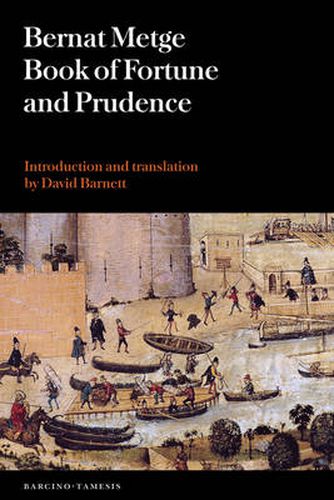Readings Newsletter
Become a Readings Member to make your shopping experience even easier.
Sign in or sign up for free!
You’re not far away from qualifying for FREE standard shipping within Australia
You’ve qualified for FREE standard shipping within Australia
The cart is loading…






Written around 1381 by Bernat Metge, the most important Catalan writer of the fourteenth century, the Llibre de Fortuna i Prudencia is a fantasy in verse, drawing on learned sources, principally The Consolation of Philosophy by Boethius.
Early one morning, Bernat, the protagonist and narrator, decides to alleviate his sorrows by strolling around the harbour of Barcelona. He meets an old man, apparently a beggar, who tricks him into getting into a boat which, despite the absence of sails and oars, conveys him to an island where the goddess Fortuna appears to him. In a heated discussion, Bernat blames her for all his misfortunes. His next meeting is with Prudenciawho is accompanied by seven maidens representing the liberal arts. Prudencia is able to lessen his despair, and exhorts him to trust in providence and renounce material possessions. When she considers him cured, she and the maidens send him sailing back to Barcelona, where he quickly goes home to avoid gossiping townsfolk.
Published in association with Editorial Barcino, Barcelona.
DAVID BARNETT, whose doctorate is from Queen Mary, University of London, continues to be involved in research on medieval Catalan literature.
$9.00 standard shipping within Australia
FREE standard shipping within Australia for orders over $100.00
Express & International shipping calculated at checkout
Written around 1381 by Bernat Metge, the most important Catalan writer of the fourteenth century, the Llibre de Fortuna i Prudencia is a fantasy in verse, drawing on learned sources, principally The Consolation of Philosophy by Boethius.
Early one morning, Bernat, the protagonist and narrator, decides to alleviate his sorrows by strolling around the harbour of Barcelona. He meets an old man, apparently a beggar, who tricks him into getting into a boat which, despite the absence of sails and oars, conveys him to an island where the goddess Fortuna appears to him. In a heated discussion, Bernat blames her for all his misfortunes. His next meeting is with Prudenciawho is accompanied by seven maidens representing the liberal arts. Prudencia is able to lessen his despair, and exhorts him to trust in providence and renounce material possessions. When she considers him cured, she and the maidens send him sailing back to Barcelona, where he quickly goes home to avoid gossiping townsfolk.
Published in association with Editorial Barcino, Barcelona.
DAVID BARNETT, whose doctorate is from Queen Mary, University of London, continues to be involved in research on medieval Catalan literature.